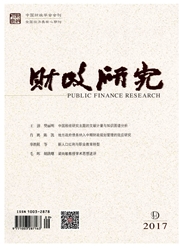

 中文摘要:
中文摘要:
通过构建土地财政规模倒U型效应的三层委托代理博弈均衡模型,对地方政府如何进行土地供应抉择进行了严谨的数理演绎,重新审视了激励制度背景下地方政府的角色如何从"经营企业"演变至"经营城市",以及"经营城市"如何进一步加剧的内在逻辑机理。研究结果表明:既有财政分权激励下,地方政府投入到商住用地供应及其公共基础设施配套建设的规模一般会高于中央政府的期望,而投入到保障房用地供应及其公共基础设施配套建设的规模一般会低于中央政府的期望,随着中央政府的更加集权,这一负面效应趋势得以有效扭转。在考虑官员晋升激励后,上述结论均得以加剧和强化。这为新常态下房地产市场供给侧的改革提供了逻辑机理的分析证据。
 英文摘要:
英文摘要:
This paper builds a game equilibrium model of three Principal-Agent level of the inverted U-curve effect on land finance scale, and conducts a rigorously mathematical deduction of land supply choice of local governments, reconsiders how the role of the local government can be evolved from"running an enterprise"to"running a city", and the logic mechanism to further intensify the role of "running a city"under the background of the incentive institution. Findings showed that: under the fiscal decentralization incentive, the scale of the local government supply on residential commercial land and relevant public infrastructure construction is generally higher than the expectation of the central government, but its scale of social security house and relevant public infrastructure construction is lower than the expectation of the central government. As the central government becomes more centralized, the trend on this negative effect will be reversed obviously. If we take the promotion incentive of government officials under consideration, the above conclusions will be strengthened. It provides an analysis evidence of logical mechanism for the supply side reform of the real estate market in new normal.
 同期刊论文项目
同期刊论文项目
 同项目期刊论文
同项目期刊论文
 期刊信息
期刊信息
